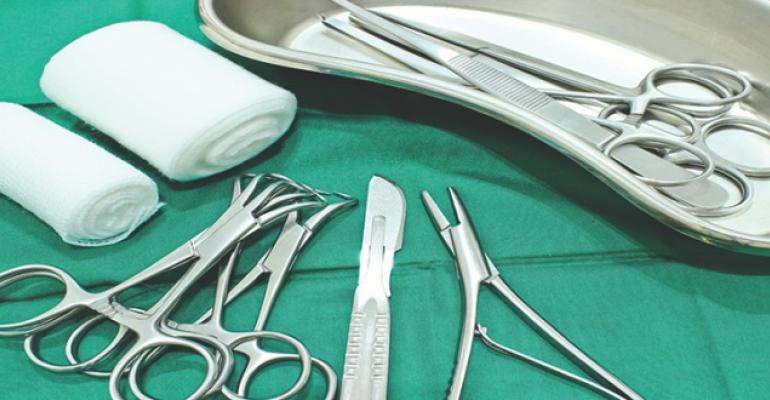What is the risk?
The potential transmission of pathogenic micro-organisms (disease causing micro-organisms) such as Hepatitis B and C, Pseudomonas, Tuberculosis and Carbapenem-resistant Enterobacteriaceae have been reported in a variety of published studies. These microorganisms can cause life threatening infections for hospitalised patients undergoing surgical procedures. It is therefore critical that medical devices are properly cleaned and appropriately disinfected or sterilised before they are used on patients. These types of infections are known as healthcare associated infections (HAI).
According to the World Health Organisation (WHO), surgical site infections are the most frequent type of HAI in low- and middle-income countries. The WHO also states that between 1.2 to 23.6 per cent per 100 patients undergoing surgical procedures develop surgical site infections in lower- and middle-income countries.
The ability of a microorganism to cause an infection in a patient depends on how virulent it was, how many were present, how susceptible the patient was and if there was a portal of entry into the patient. A contaminated medical device could facilitate a portal of entry for a pathogenic microorganism. If a patient develops a HAI it places a significant burden on the healthcare system. It will affect the patient’s length of stay in hospital, which could result in increased medical costs for the patient and his family, and it could cause long term disabilities or death of the patient.
The prevalence of HAI in sub-Saharan Africa is much higher (between 6.7 and 28 per cent) than in Europe. A patient with a predisposed infection like human immunodeficiency virus (HIV) or tuberculosis (TB) who undergoes a medical or surgical procedure with a poorly decontaminated instrument will, therefore, have an even greater chance of developing a HAI.
An important point to consider is that approximately 81 per cent of the 7 billion people in this world live in low and middle-income countries. Low and middle-income countries have resource constraints, which often prevent them or inhibit them from following international recognised repossessing guidelines.
Preventing HAI associated with contaminated devices should be a priority for all countries especially low and middle-income countries with resource constraints.
What is the solution?
One solution is to follow manufactures instructions for use and create Standard Operating Procedures. Not all medical devices are cleaned and sterilised in the same manner, which is why it is important to follow the MIFU (manufacturer’s instructions for use). If the MFIU are not followed correctly it could result in direct harm to the patient and could also result in damage to the device itself. Some medical devices require more reprocessing steps than others, which could include the reprocessing instructions for brushing, flushing and ultrasonic cleaning for example.
Another way to prevent outbreaks of infection associated with contaminated medical devices is to ensure that those persons tasked with decontaminating devices are well trained or educated in their field. It is the responsibility of the healthcare institution to train their staff, and the training should be based on various manufacturers’ instructions for decontamination.
In the South African context, groups and pockets of Central Sterile Services Department (CSSD) staff (those responsible for decontamination) took it upon themselves to come together in various regions to share their knowledge and experiences. In addition, they organised presentations by device manufacturers that were able to assist the healthcare institutions by providing in-service education and training materials.
Another way to prevent outbreaks of infection associated with contaminated medical devices is to ensure that those persons tasked with decontaminating devices are well trained or educated in their field.
The CFSA
In 2013, the pockets of CSSD staff were united into a national organisation known as the CFSA (CSSD forums of South Africa). Prior to the formation of the CFSA, CSSD departments were like lost souls, with each unit trying to do the best they could with the knowledge that had been collected over the years with in service training and reading.
The first national event was a congress hosted at the Africa Health in 2013. Partnering with Africa Health has facilitated a basis for learning, being exposed to local and international best practices. As noted by the author “it felt as if we all had purpose and we realised that we did not have enough information or proper reference guides to do our work optimally”.
Regular regional CSSD forums are hosted throughout South Africa every year. CSSD’s now have a network through which they could communicate and share knowledge, uniting staff from different hospital groups in both the private and provincial sector. The CFSA standard operating procedures where written and CSSD practices are based on scientific knowledge and not just on assumption.
The CFSA has become a formidable body that grows every year in association with Africa Health. We are exposed to the latest scientific information and research and with our national chairperson attending international congresses and bringing the knowledge home.
Although we have come a far way in our practices we need to grow even further, this can only be done together as a collective society. As the CFSA grows in strength we hope to share our knowledge with all who want to learn from us on the African continent and beyond.
References available on request.

